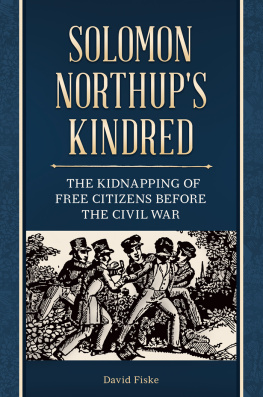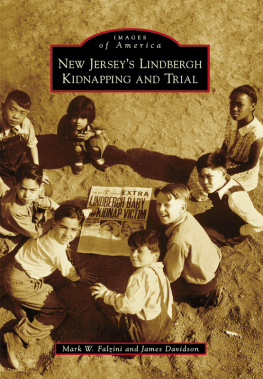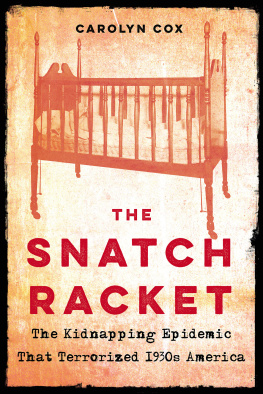Solomon Northups
Kindred
The Kidnapping of Free Citizens
before the Civil War
David Fiske

Copyright 2016 by David Fiske
All rights reserved. No part of this publication may be reproduced, stored in a retrieval system, or transmitted, in any form or by any means, electronic, mechanical, photocopying, recording, or otherwise, except for the inclusion of brief quotations in a review, without prior permission in writing from the publisher.
Library of Congress Cataloging-in-Publication Data
Names: Fiske, David, author.
Title: Solomon Northups kindred : the kidnapping of free citizens before the Civil War / David Fiske.
Description: Santa Barbara, California : Praeger, 2016. | Includes bibliographical references and index.
Identifiers: LCCN 2015037767 | ISBN 9781440836640 (hard copy : alk. paper) | ISBN 9781440836657 (ebook)
Subjects: LCSH: Free African AmericansHistory19th century. | KidnappingUnited StatesHistory19th century. | Free African AmericansLegal status, laws, etc. | African AmericansHistoryTo 1863. | SlaveryUnited States.
Classification: LCC E185.18 .F54 2016 | DDC 973/.0496073dc23 LC record available at http://lccn.loc.gov/2015037767
ISBN: 9781440836640
EISBN: 9781440836657
20 19 18 17 161 2 3 4 5
This book is also available on the World Wide Web as an eBook.
Visit www.abc-clio.com for details.
Praeger
An Imprint of ABC-CLIO, LLC
ABC-CLIO, LLC
130 Cremona Drive, P.O. Box 1911
Santa Barbara, California 93116-1911
This book is printed on acid-free paper 
Manufactured in the United States of America
Contents
Introduction
This book is intended to build upon Carol Wilsons study of this topic, Freedom at Risk: The Kidnapping of Free Blacks in America, 17801865. That work provides an overview of how free blacks were kidnapped and sold into slavery, assistance the government provided to free blacks, and how black citizens and abolitionists responded to crimes of kidnapping. It also includes a significant amount of information on the operations of one of the most notorious kidnapping operations, the Cannon-Johnson gang, which was responsible for numerous abductions along the Pennsylvania-Delaware border in the early nineteenth century.
In the process of doing research on the life of Solomon Northup (now one of the most well-known victims of kidnapping, thanks to the Academy Awardwinning film 12 Years a Slave), I stumbled onto many more cases of kidnappingsome, such as that of Eli Terry, with similarities to the experience of Northup. Sadly, our national history includes many instances of citizens stealing the liberty of fellow citizens. It will never be known precisely how many free citizens were kidnapped and enslaved, but it seems clear that it took place with relative regularity.
Undoubtedly, most people who have seen the film 12 Years a Slave come away thinking about how terrible it was that a free man of color was hoodwinked, kidnapped, and sold into bondage. But the experience of Solomon Northup was by no means unique. The same thing happened to many others. Some were rescued before their kidnappers were able to complete the process of selling them into slavery, while others became slaves for months or years before their releases were accomplished.
Kidnapping is an atrocious crime by any standard, and whatever the motive behind it. But kidnapping with the intent and result of stealing a persons ability and right to pursue a life of his or her own choosingfor the remainder of the persons lifeseems especially cruel and reprehensible. By taking away a persons freedom, kidnapping is just one step below the taking of his life. Consider also the disruption and heartbreak suffered by the victims family and friends, the fear that such crimes instilled among free black populations, and the loss to communities in free states of the talents and abilities of some of their neighbors. Free coloured [sic] citizens, read an 1840 report on the kidnapping problem in New York State, occupy places and discharge duties, important to the interests and essential to the comfort and convenience of society. The loss of these fellow citizens, to the vile institution of slavery, was of consequence to everyone.
Even in free states, African Americans often enjoyed less than full civil rights. This probably made it easier for kidnappers to commit their crimes, and it surely allowed them to justify their actions in their own minds. Laws affecting black citizens only (such as the black codes in Ohio, Indiana, and Illinois), and other discriminatory legal provisionssuch as, in New York State, the requirement that free blacks own real property in order to vote, and their exclusion from jury and militia servicefueled racial attitudes and stereotypes. Such feelings led, in some cases, to the lack of concern when crimes were perpetrated against African Americans.
Though slavery had been abolished in the northern states long before the Civil War, the kidnapping issue helped give the horror of slavery a presence in those states, since free people could be cast into bondage. The fact that kidnappers were able to operate with a certain level of efficiency and success, and that some of those who were detected received only light punishment (or even none at all), is a reminder that, even in free states, slavery had those who supported (or at least tolerated) it.
Somewhat counterbalancing the repugnance of the crimes related here, there remains the fact that noble efforts were often made by citizens determined to assist victims. People from the neighborhoods where victims had lived in freedom undertook rescue missions that sometimes involved lengthy and inconvenient journeys. Attorneys came forwardin both free and slave statesto help victims seek their release according to law, and some individuals who believed in justice listened to victims and conveyed information about them as a first step in getting them released. A chapter of this book is devoted to some of those who provided assistance to victims in various ways.
As someone who specializes in uncovering lost history, I feel proud to be able to tell the tragic stories of some of these victims. Though I find it unsettling to have learned that so many crimes were committed, that feeling is partially offset by the satisfaction of being able to recover the stories of people whose lives have otherwise been long overlooked. Their stories are a stain on our national history; a stain thatgiven social prejudices, governmental actions, and a system of slavery that gave some people nearly total control over the minds and bodies of otherswas bound to appear. I have tried to keep the focus of this book on the victims, in order to tell their stories as well as they can be told.
In addition to telling the stories of several dozen victims of kidnapping, this book also provides some historical context to help explain why and how these kidnappings occurred.
Kidnappings prevalence can be attributed, at least in part, to various factors that served as motivation for the crime, and which made it an attractive activity for criminals to pursue. The very active internal slave trade in the United States meant that a commercial network was readily available for marketing and transporting people illegally sold into slavery. Although financial gain was a major motivator for kidnappers, some were induced to abduct free blacks in order to replace slave labor, which they were denied after slaves they owned ran away. Resistance in free states to returning fugitives from bondage led owners of absconded slaves to seek a remedy outside the legal system, which they believed had failed them.












